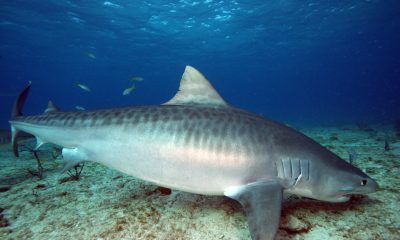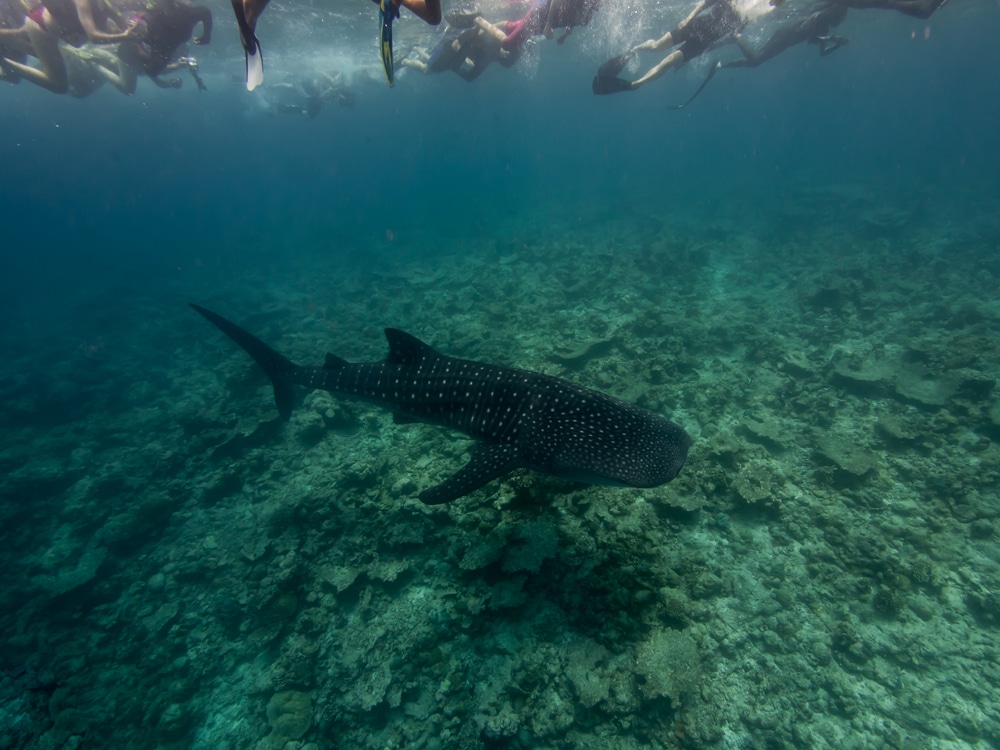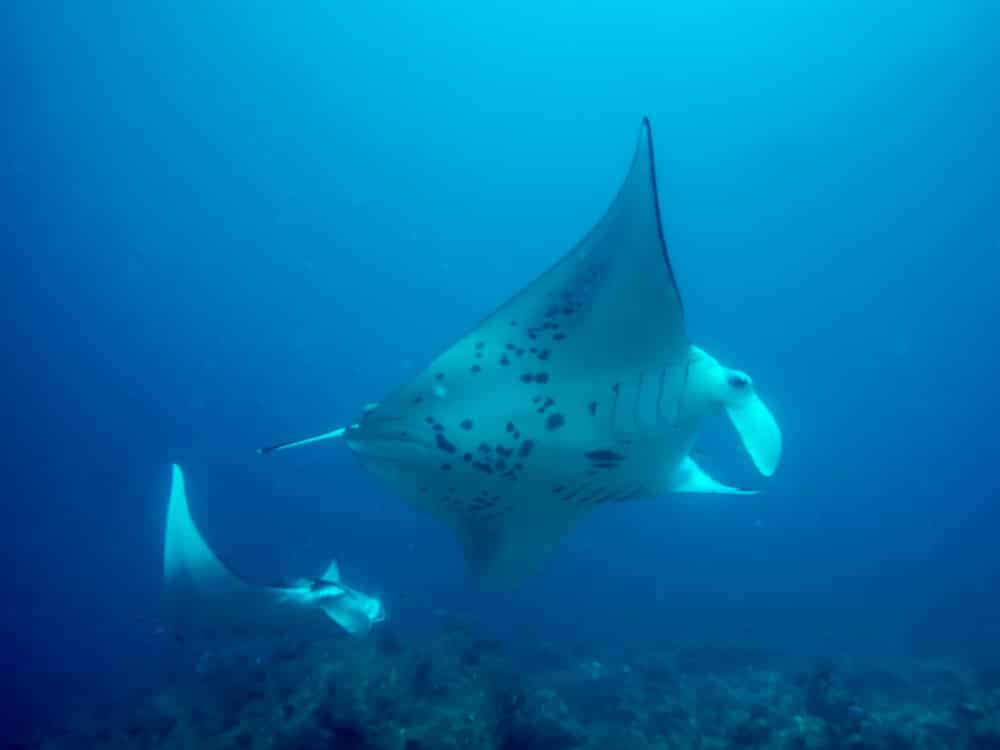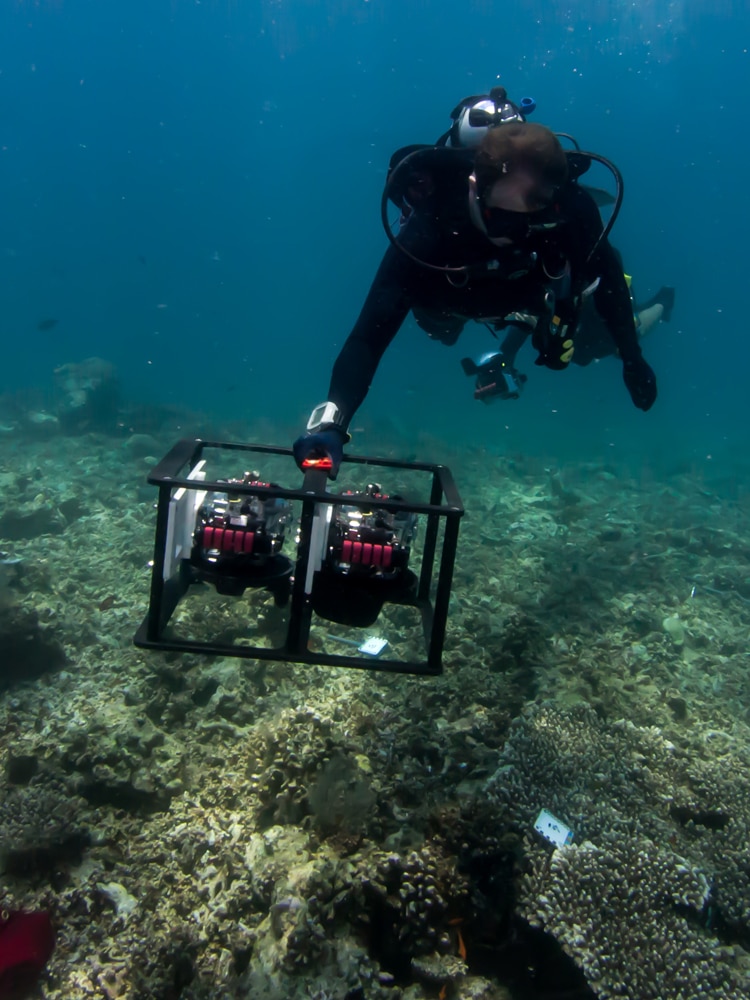Marine Life & Conservation
Carpe Diem: Dive with a Purpose 2018, with the 100 Island Challenge

Scubaverse Contributor Yo-Han Cha reports from his recent liveaboard trip in the Maldives…
It’s been stunning out here in the Maldives. In the first two days we saw mantas and a whale shark – not a bad start to a week on a liveaboard, in fact it was beyond anything I expected. It was a dream start to the trip and Mother Nature and the Carpe Diem staff have certainly delivered.
But this trip wasn’t just about us having fun and enjoying the underwater wildlife of the Maldives, Carpe Diem had us diving with a purpose and we had Brian Zgliczynski and Clinton Edwards from the Scripps Institution of Oceanography, UC San Diego who were here as part of their 100 Island Challenge campaign.
What is the 100 Island Challenge?
To quote Scripps:
“No two coral reefs are the same, and no two reefs will face the future in the same way. This variability, however, can teach us lessons about how to manage coral reefs for the best future possible.”
The 100 Island Challenge is a five year campaign where they’ll aim to survey 100 islands and to resurvey them every two years to plot any changes. 81 islands have been surveyed so far with some of them have already had their two-year resurvey. The 100 Island Challenge team is aiming to complete 95 by the end of 2018.
One of their main methods of data collection is using photogrammetry to survey the reef – other methods being benthic and fish biomass assessments – but on this trip, there was a focus on the photogrammetry. For those of you who are unfamiliar with what it is, photogrammetry is where hundreds, if not thousands, of photographs are processed by computer software to produce a 3D model.
I had come across it before to survey wrecks but it’s not something I’d ever attempted before. This has proved to be an excellent tool for surveying coral reefs as they don’t move, and by surveying the same site over time, the Scripps team have been able to monitor, not just a single snapshot of coral population and distribution but the growth, death and regrowth of the exact same corals in a specific area of the reef.
Which brings us back to the Maldives, with Brian and Clinton here to firstly see if the Maldives was somewhere suitable for the 100 Island Challenge and to test their camera equipment. We, the non-scientist guests, were encouraged to take our cameras and with a brief instruction before the start of the dive, go survey a small coral for ourselves.
Brian and Clinton were using DSLRs and today they mounted two of them together (quite a sight!) in order to survey a section of the reef in a 5m x 5m grid. Nobody else on the trip had a DSLR to take underwater and none of were expected to do a grid survey, but four of us, with four different makes and models of camera, ranging from a simple compact to a mirrorless, went out, chose a coral and gave it a go, not really knowing what the end result would be.
Due to our different cameras, some of us had to approach it slightly differently. I shot in continuous mode and kept the trigger down whilst I swam steadily around my coral. After years of photography where I’ve been told to shoot into the blue for good negative space and to shoot up, the most difficult part of me was to go against my instincts and avoid having any blue in the shot and to shoot down! However, the award for having the most patience and diligence went to Daphne as she individually took over a hundred images of a coral with her compact.
The results for all four of us were in my opinion amazing and I’m not just saying so because one of them’s mine. Considering that due to time constraints Clint processed the images at a lower resolution than he would do normally (Scripps are going to process them at full resolution when they get back to San Diego) and that we were total novices to this, the results were a lot more detailed than I expected them to be, which is exciting in more than one way as it shows that this method of surveying is one that can be easily trained to others.
We’re now, sadly, just over halfway through our trip. The diving, the staff and the liveaboard have been excellent and it’s been exciting to learn how we, each in our small way, can make a difference.
For more information on the 100 Island Challenge click here.
For more information about Scripps Institution of Oceanography click here.
For more information about Carpe Diem click here.
Marine Life & Conservation
Leading UK-based shark conservation charity, the Shark Trust, is delighted to announce tour operator Diverse Travel as a Corporate Patron

 Corporate Patrons provide a valuable boost to the work of The Shark Trust. The Trust team works globally to safeguard the future of sharks, and their close cousins, the skates and rays, engaging with a global network of scientists, policymakers, conservation professionals, businesses and supporters to further shark conservation.
Corporate Patrons provide a valuable boost to the work of The Shark Trust. The Trust team works globally to safeguard the future of sharks, and their close cousins, the skates and rays, engaging with a global network of scientists, policymakers, conservation professionals, businesses and supporters to further shark conservation.
Specialist tour operator Diverse Travel has operated since 2014 and is committed to offering its guests high quality, sustainable scuba diving holidays worldwide. Working together with the Shark Trust will enable both organisations to widen engagement and encourage divers and snorkellers to actively get involved in shark conservation.
“Sharks are truly at the heart of every diver and at Diverse Travel, we absolutely share that passion. There is nothing like seeing a shark in the wild – it’s a moment that stays with you forever!” says Holly Bredin, Sales & Marketing Manager, Diverse Travel.
“We’re delighted to celebrate our 10th year of business by becoming a Corporate Patron of the Shark Trust. This is an exciting partnership for Diverse and our guests. We will be donating on behalf of every person who books a holiday with us to contribute towards their vital shark conservation initiatives around the world. We will also be working together with the Trust to inspire divers, snorkellers and other travellers to take an active role – at home and abroad – in citizen science projects and other activities.”
Paul Cox, CEO of The Shark Trust, said:
“It’s an exciting partnership and we’re thrilled to be working with Diverse Travel to enable more divers and travellers to get involved with sharks and shark conservation. Sharks face considerable conservation challenges but, through collaboration and collective action, we can secure a brighter future for sharks and their ocean home. This new partnership takes us one more valuable step towards that goal.”
For more information about the Shark Trust visit their website here.
For more about Diverse Travel click here.
Marine Life & Conservation
Shark Trust Asks Divers to help with Shark Sightings this Global Citizen Science Month

 Whether you are stuck for ideas of what to do with the kids or are off on the dive trip of your dreams. You can get involved in Citizen Science Month and help the Shark Trust by providing vital data about sharks are rays both close to home and further afield.
Whether you are stuck for ideas of what to do with the kids or are off on the dive trip of your dreams. You can get involved in Citizen Science Month and help the Shark Trust by providing vital data about sharks are rays both close to home and further afield.
In addition to reporting the sharks and rays you see on your dives, the eggcases you find on the beach, the Shark Trust is looking for some specific data from divers who are asked to report any Oceanic Whitetip and Basking Sharks.
Oceanic Whitetip Sharks
The Shark Trust are looking specifically for Oceanic Whitetip Shark sightings over the coming weeks and months. So, if you are diving anywhere in the world, please report your sightings via the website or app.
Website: https://recording.sharktrust.org/
App: Search The Shark Trust in your app store
The Oceanic Whitetip. Known for their incredibly long dorsal and pectoral fins, this species was once the most abundant oceanic-pelagic species of shark on the planet.
Large and stocky, they are grey or brown above, and white below and famous for their huge rounded first dorsal fin and paddle-like pectoral fins. The fins also highly prized within the shark fin trade. Whilst they are mostly solitary, Oceanic Whitetips do occasionally hunt in groups.
An inquisitive species, they were easy prey for fisheries. Combined with their low reproductive rate, they were inevitably at high risk of population depletion. And declines of up to 99% have been reported in certain sea areas. They are listed as Critically Endangered on the IUCN Redlist (2019).
Conservation efforts to discourage further declines include listing on CITES Appendix II and CMS Appendix I. They’re also the only species prohibited from take by all the Tuna RFMOs (Regional Fisheries Management Organisations). However, these measures do not mean that Oceanic Whitetips are not still caught – whether targeted or as bycatch – in some parts of the world. With populations declining at such a high rate, effective implementation of management measures is essential to ensure that the species can recover.
If you are lucky enough to get an image of an Oceanic Whitetip and you record your sighting on the Shark Trust app or website YOU CAN WIN! All images submitted with sightings, that also give consent to use in conservation messaging, will be in with a chance to win an Oceanic Whitetip T-shirt and mug. The competition will run until the end of “Shark Month” in July – so keep those sightings (and images) coming in.
Basking Sharks
Basking Shark (Cetorhinus maximus) season is upon us, and the Shark Trust is asking everyone to keep an eye out for these majestic giants over the summer months. If you see any, you can record your sighting to the Basking Shark Sightings database.
Each year, these mighty fish return to British waters to feed on plankton. You may see one, (or a few if you’re really lucky) from around April-October. They can be seen feeding at the surface of the water, where they look like they’re basking in the sun. Thus, their name!
Sighting hotspots around the British Isles include southwest England, Isle of Man, north coast of Ireland, and western Scotland. The Sea of the Hebrides is the most prolific sightings area in Scotland, but they have been spotted all around the coast and have even ventured into some of the sea lochs. The Shark Trust has received thousands of sightings since the Basking Shark project began, but more data is needed to truly understand what is going on with population numbers and distribution. You can help by recording your sightings this summer.
Great Eggcase Hunt
The Shark Trust has an Easter Egg Hunt with a difference for you to try. Take part in the Great Eggcase Hunt and get involved with a big citizen science project that helps shark, ray and skate conservation. And it’s an enjoyable activity for all the family.
The Shark Trust also want snorkellers and divers to record their underwater eggcase findings. Underwater records help pinpoint exactly where sharks and skates are laying their eggs and can help link to beach records. Learning the depth and substrate that they lay on also helps better understand the species.
Find out more: https://www.sharktrust.org/great-eggcase-hunt
Whether you are diving, snorkelling or exploring on the beach you can take part in Citizen Science Month and get actively involved in shark and ray conservation. Find out more: www.sharktrust.org
-

 News3 months ago
News3 months agoHone your underwater photography skills with Alphamarine Photography at Red Sea Diving Safari in March
-

 News2 months ago
News2 months agoCapturing Critters in Lembeh Underwater Photography Workshop 2024: Event Roundup
-

 Marine Life & Conservation Blogs2 months ago
Marine Life & Conservation Blogs2 months agoCreature Feature: Swell Sharks
-

 Blogs1 month ago
Blogs1 month agoMurex Resorts: Passport to Paradise!
-

 Gear News3 months ago
Gear News3 months agoBare X-Mission Drysuit: Ideal for Both Technical and Recreational Divers
-

 Blogs2 months ago
Blogs2 months agoDiver Discovering Whale Skeletons Beneath Ice Judged World’s Best Underwater Photograph
-

 Gear Reviews2 months ago
Gear Reviews2 months agoGear Review: Oceanic+ Dive Housing for iPhone
-

 Blogs3 months ago
Blogs3 months agoThe Thrilling Encounter with Tiger Sharks at Beqa Lagoon’s ‘The Colosseum’ with Coral Coast Divers












